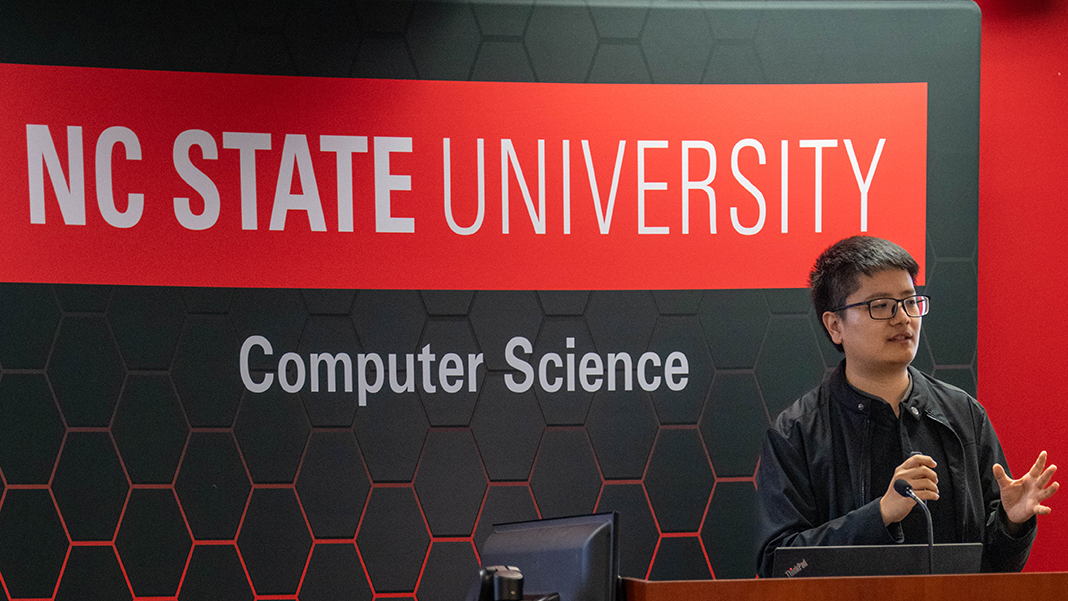Five members of the faculty of the College of Engineering at North Carolina State University have received Faculty Early Career Development (CAREER) Awards from the National Science Foundation (NSF) in 2022.
The award is one of the highest honors given by NSF to young faculty members in science and engineering.
This year’s awardees are:
Bradley Reaves

Bradley Reaves, assistant professor in the Department of Computer Science, will receive $606,848 over five years for his project “Increasing Trust and Reducing Abuse in Telephone Networks.”
Unsolicited phone calls, also known as robocalls, are one of the most pervasive and visible network security problems in the United States. Despite the sincere efforts of telephone providers, regulators, legislators and technologists, there are virtually no consistently effective countermeasures. The project’s novelties are in creating technical solutions that will empower regulators and providers to stop robocalling at scale. The project’s broader significance and importance lie in dramatically improving the security and trustworthiness of the telephone network and, in so doing, restoring the telephone network as a useful communications medium.
The goal of this work is to end the scourge of unsolicited phone calls by creating new techniques to detect abusive actors, restore trust in telephony by positively authenticating all phone calls and prevent compromises of Internet voice infrastructure that would enable robocall abuse. The principal methodologies include developing threat intelligence, designing secure and privacy-preserving protocols, conducting Internet-scale measurement and call audio analysis. This project is also developing public information campaigns, operator and regulator training, and telephone security content for network security courses.
Ashly Cabas

Ashly Cabas, assistant professor in the Department of Civil, Construction, and Environmental Engineering, will receive $606,848 over five years for her project “Multiscale Probabilistic Characterization of Seismic Site Response in Highly Uncertain Environments.”
This project will advance scientific knowledge on the response of soils to earthquake ground shaking at multiple scales and enable its incorporation into system-level probabilistic seismic hazard assessments for water distribution systems. The spatially variable geologic structure near the ground surface exerts a significant influence on the intensity of ground shaking (known as site effects) and can exacerbate damage to the built environment. Drinking water and wastewater utilities are critical lifelines because of the significant negative effects of earthquake damage on the ability to fight fires, on public health and on the economy. This CAREER grant will foster a paradigm shift in system-level seismic hazard assessments for water distribution systems to overcome current practices that oversimplify the effects of near-surface geologic conditions. Accounting for site effects and uncertainty can reduce damage and service losses and improve post-event rapid damage assessments.
Albert Keung

Albert Keung, assistant professor in the Department of Chemical and Biomolecular Engineering, will receive $825,816 over five years for his project “A Synthetic Biology Platform to Map and Engineer the Diverse Epigenetic Space.”
This project will develop new technological platforms and educational innovations that will unlock our understanding of and ability to control the expression of genes in higher order organisms from yeast and plants to humans, with broad applications in biotechnology. Chromatin is the layer of hundreds of proteins bound on top of the genome. It confers regulatory handles over diverse cellular and organismal processes including aging and cancer, and it could be leveraged in biotechnological applications including bioremediation, environmental sensing and bio-based production of commodity chemicals. Chromatin also provides a strong topic for pedagogical innovation and enrichment. This project will develop hands-on experiments for middle and high school students that connect molecular changes in chromatin to effects observable by eye, in this case the binding of yeast cells to the surface of an agar plate. Furthermore, the numerical and biochemical diversity of chromatin advocates for new pedagogical approaches at the collegiate and Ph.D. levels.
Spyridon Pavlidis

Spyridon Pavlidis, assistant professor in the Department of Electrical and Computer Engineering (ECE), will receive $500,000 over five years for his project “Engineering Ultra-Wide Bandgap III-Nitride Devices for Highly Efficient and Robust Electronics.”
The global demand for energy will likely significantly increase in the coming decades as more of the world gains access to electricity. This demand will need to be met without intensifying existing concerns over the environmental, societal and economic impacts of climate change, which is influenced by the efficiency of power systems. Furthermore, since this efficiency is tied to losses associated with the semiconductor devices used in power electronics, the replacement of today’s silicon-based components with a novel semiconductor technology must be investigated. Wide bandgap semiconductors are candidates, however ultra-wide bandgap (UWBG) semiconductors represent the next frontier.
The objective of this CAREER project is to understand the performance limits of ultra-wide bandgap AlGaN-based power devices and establish solutions to deploy these devices in highly efficient and robust systems.
Wenyuan Tang

Wenyuan Tang, assistant professor in ECE, will receive $500,000 over five years for his project, “Pricing Non-convexities Toward Transparency in Electricity Markets.”
Despite the intention of providing the right signals to incentivize efficient market outcomes, pricing has been a major challenge in electricity market design, due to the discrepancy between the idealistic convexity assumptions in economics and the practical non-convexities of the operating characteristics of generating units. Corrective measures have been adopted, such as side-payments for cost recovery, but at the expense of compromising transparency. The issue of transparency has been a persistent concern from the stakeholders: the rationale behind a market mechanism is unclear, the settlement process is obscure, the evidence of effectiveness is insufficient and so forth.
The goal of this five-year project is to build analytical frameworks to understand, evaluate and adapt the evolving market mechanisms, toward the long-term goal of creating market mechanisms and providing policy recommendations that enhance the transparency, reduce the manipulation and ultimately improve the efficiency of electricity markets. With these awards, the faculty of the College of Engineering at NC State has garnered 25 CAREER Awards in the last five years.
- Categories:



